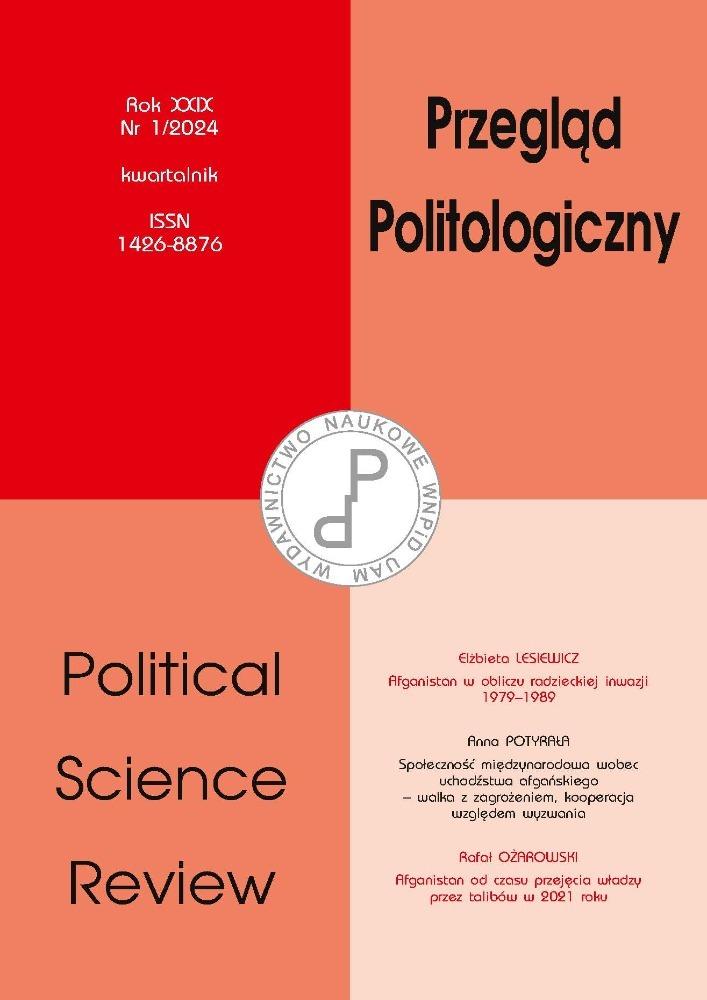Abstract
The decision to withdraw U.S. troops from Afghanistan in 2021 resulted in immediate coverage of the Afghan Taliban, who immediately began working to seize power. Currently, more than two years have passed since Afghanistan has been under the rule of the Taliban. During this time, political and economic changes took place and the international perception of Afghanistan changed. Based on the systemic method, the article carried out an analysis that helped to give answer the research questions regarding the political and economic situation of Afghanistan; the threat of terrorism and the place and role of Afghanistan in international politics, especially Pakistan and Iran. The research hypothesis put forward in the text is that the takeover of power by the Taliban in 2021 has led to the marginalization of the state in the international arena and prevented the constructive development of Afghan political and economic potential. Afghanistan remains one of the poorest and ruined countries in the world. After verifying the hypothesis and answering the research questions, the conclusions were drawn that Afghanistan is still politically marginalized in the international arena, although many countries maintain unofficial political and economic relations with it. The economic situation, despite the corrective actions taken by the Taliban government, is still very difficult and millions of citizens of this country live in poverty.
References
Afghanistan Inflation Data: Rate, CPI, Food, Harmonised, Take-Profit.Org, https://take-profit.org/en/statistics/inflation-rate/afghanistan/, 11.11.2023.
Bahous S. (2022), Statement: ‘Meticulously constructed policies of inequality’ Afghanistan one year on, UN Women, 15 August 2022, https://www.unwomen.org/en/news-stories/statement/2022/08/statement-meticulously-constructed-policies-of-inequality-afghanistan-one-year-on, 07.11.2023.
Bateman K., Mir A., Watkins A. (2022), After al-Zawahiri’s Killing, What’s Next for the U.S. in Afghanistan?, United States Institute of Peace, 2 sierpnia 2022, https://www.usip.org/publications/2022/08/after-al-zawahiris-killing-whats-next-us-afghanistan, 6.11.2023.
Byrd W. (2023), Two Years into Taliban Rule, New Shocks Weaken Afghan Economy, “Analysis and Commentary”, United Stated Institute of Peace, 10 August 2023, https://www.usip.org/publications/2023/08/two-years-taliban-rule-new-shocks-weaken-afghan-economy, 9.11.2023.
Davidian A. (2022), Press briefing: The situation of women and girls in Afghanistan, UN Women, 25 July 2022, https://www.unwomen.org/en/news-stories/speech/2022/07/press-briefing-the-situation-of-women-and-girls-in-afghanistan, 10.11.2023.
Desjardins L. (2022), Taliban further restricts women’s rights, forcing aid groups to halt work in Afghanistan, “PBS News Hour” 26 December 2022, https://www.pbs.org/newshour/show/taliban-further-restricts-womens-rights-forcing-aid-groups-to-halt-work-in-afghanistan, 10.11.2023.
Felbab-Brown V. (2023), Afghanistan in 2023: Taliban internal power struggles and militancy, “Commentary” Brookings, 3 February 2023, https://www.brookings.edu/articles/afghanistan-in-2023-taliban-internal-power-struggles-and-militancy/, 8.11.2023.
Global Terrorism Index 2022, Institute for Economics & Peace.
Global Terrorism Index 2023, Institute for Economics & Peace.
Gul A. (2023), Pakistan Turns Up Heat Over Cross-Border Attacks, “Voanews”, 5 October 2023, https://www.voanews.com/a/pakistan-turns-up-heat-over-cross-border-attacks-/7298839.html, 8.11.2023.
Hausch L. (2019), Understanding the Fatemiyoun Division: Life through the Eyes of a Militia Member, “Policy Analysis”, Middle East Institute, 22 May 2019, https://www.mei.edu/publications/understanding-fatemiyoun-division-life-through-eyes-militia-member, 9.11.2023.
Jami M., Rizwan A., Taieb R. (2021), Mending Fences? Iran and Afghanistan adjust to a new security environment, Institute of War and Peace Studies.
Jones S. G. (2020), A Failed Afghan Peace Deal, “Contingency Planning Memorandum”, nr 37, 1 June 2020, https://www.cfr.org/report/failed-afghan-peace-deal.
Kugiel P. (2020), Porozumienie USA z talibami, „Komentarz” Polski Instytut Spraw Międzynarodowych, nr 15, 3 marca 2020.
Kugiel P. (2022), Rok po przejęciu władzy przez talibów, „Biuletyn PISM”, Polski Instytut Spraw Międzynarodowych, nr 129, 11 sierpnia 2022.
Kugiel P. (2023), Afganistan po dwóch latach rządów talibów, „Biuletyn PISM”, Polski Instytut Spraw Międzynarodowych, nr 111, 11 sierpnia 2023.
Maizland L. (2020), U.S. – Taliban Peace Deal: What to Know, Council on Foreign Relations 2 March 2020, https://www.cfr.org/backgrounder/us-taliban-peace-deal-agreement-afghanistan-war, 7.11.2023.
Taliban gives a warm welcome to China’s new ambassador to Afghanistan, “Al Jazeera” 13 September 2023, https://www.aljazeera.com/news/2023/9/13/taliban-gives-a-warm-welcome-to-chinas-new-ambassador-to-afghanistan, 9.11.2023.
de Toledo Gomes Aureo, Mikhael Mitri Michelle (2018), Terror or Terrorism? Al-Qaeda and the Islamic State in Comparative Perspective, “Brazilian Political Science Review”, vol. 12, nr 1. DOI: https://doi.org/10.1590/1981-3821201800010002
WFP Afghanistan. Situation Report (World Food Programme), 18 January 2023.
License
Copyright (c) 2024 Rafał Ożarowski

This work is licensed under a Creative Commons Attribution-ShareAlike 4.0 International License.

